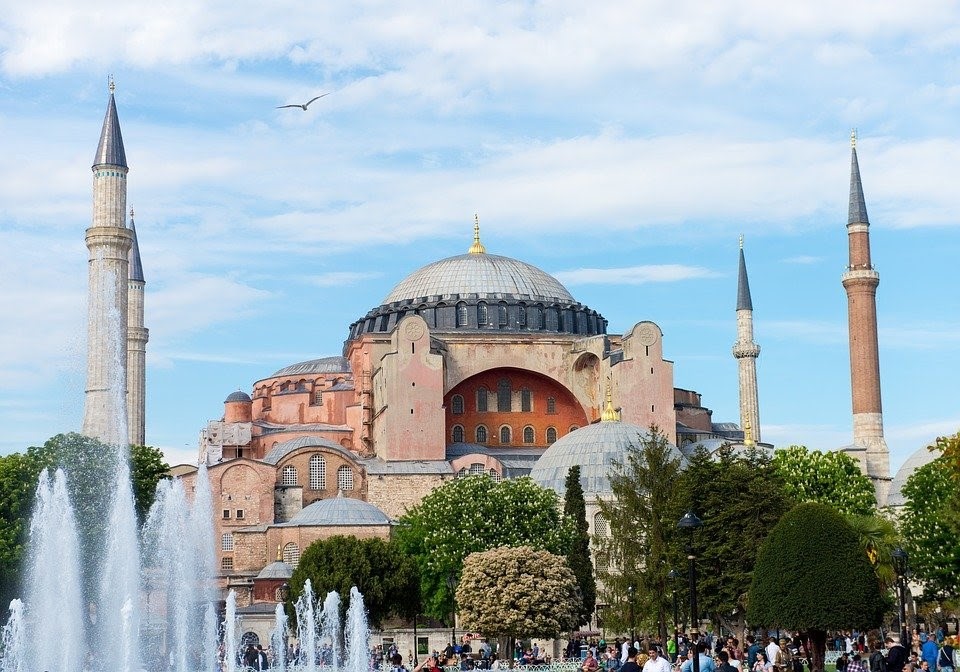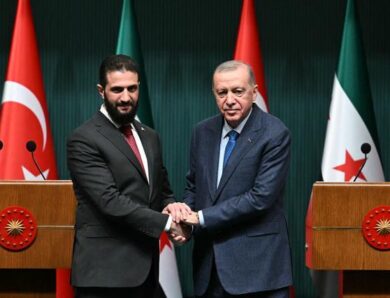
Diplomatic relations between Greece, its neighbours and great powers since 2018
At what seemed in 2004 as an apotheosis for Greece, Athens welcomed the XXVIIIth modern Olympic Games, feeling pride to be associated with a worldwide positive event. Soon later, as if the odds were against them, Aristote heirs ran into a violent crisis, hurting its very sovereignty, constraining its economy and policy-making. Once more, the Hellenic State seemed to face a great catastrophe. A century ago, it experienced such a national roller-coaster, firstly pushing back its borders from Olympe Mount slopes to the gates of Constantinople, before that occurred the Megali Katastrophḗ i.e. the defeat inflicted by Turkey’s new master Mustafa Kemal. Throughout the Cold War, the birth of a modern democracy and – more prosaically – a Greek relative power diminution, the Megali Idea imperialist project lost sense. Without any more territorial reinvidications, the Hellenic Republic and Balkan states chased together better neighbourly relations. Nevertheless, numerous bordering bones of contention have still been poisoning talks with Turkey, unveiling a deeply-rooted mistrust to say the least. Furthermore since the sovereign debt crisis, the Balkan have been disputed between great powers. This article explores Greek endeavours to fit in those 21st century diplomatic games, keeping in mind events which enlightens its current defensive behaviour.
Credit: Wikipedia, public domain
Greek territorial gains
Solving border issues in Epirus
For a few years, Greece has solved several neighbourly quandaries on the west. The Prespes agreement settled the quarrel between Athens and Skopje, over the name of the latest state. This deal was broadly unpopular according to the polls and partly favoured the defeat of SYRIZA in the following elections. A broad majority did not approve this implicit independent Macedonian culture acknowledgment, an identity that they see as deeply intertwined with former Greek states. In a less controversial way, Greece improved its relations with Albania, both agreeing to solve their border dispute through the Hague International Court of Justice.
Greek Foreign Minister Nikos Dendias and Albanian Prime Minister Edi Rama giving a press conference after talks on October 20, 2020
A Balkans partner no one neglects
As a consequence of the Prespes treaty, Russia retaliated Greece in August 2018, for the removal of its veto on broadening NATO to North Macedonia. Russia and Greece keep their long-time ambiguous ties, allying to defend Orthodox and Balkan states independence but maneuvering when one moves forward at the other’s expense.
North Macedonia officially joined the NATO on March 20, 2020
While Moscow aims at maintaining some of its old grip over southern Slavic states, China does not hide anymore in the shadow. As Athens difficulties were an opportunity Beijing exploited, the Hellenic Republic is one of the battlefields between China and the US: “China itself has identified Greece as the dragon’s head of the Belt and Road initiative in Europe” ambassador Geoffrey Pyatt said, as Athens officially joined the BRI in August 2018.
To some extent, this ambitious project undermines Greece’s autonomy, as Athens has identified shipping as a main specialization. Nevertheless, playing stingy Europeans against the investment-friendly China gives some credit to Athens negotiators before Brussels. A debt relief deal was signed in June 2018 with Eurozone countries, in order to move from a Troika dependency – organised by the IMF and Eurozone institutions – to self-financing on the bond market.
Stop and go with Turkey
Credit: EPA/EFE.
From the left to the right, Turkey’s Directorate of Religious Affairs Ali Erbas, Recep Tayyip Erdogan, Alexis Tsipras and Greek Orthodox Ecumenical Patriarch Bartholomew I of Constantinople pose before their meeting in Ankara, February 5, 2019.
It seems that on both sides of the Aegean, no one considers ever possible any positive sum exchange between the two countries. Last August, Greece and Turkey were on the verge of clashing over maritime boundaries on the western Anatolian coast. This is only one of the long-standing bones of contention between the two countries.
Credit: Bloomberg
Turkey and Greece mainly disagree on the territorial waters and exclusive economic zone around the Kastellórizo island. This tiny islet – the one the most at the east alongside Turkish shores – legally enables Greece to claim some. But to what extent?
2021 marks the bicentennial of the War of Independence against current Turkey’s predecessor the Ottoman Empire. Many years later, both states simply cannot put aside their historical background to sit around the table. As a reminder, the 1923 Treaty of Lausanne abruptly ended Greek ambitions to hold power over the Straits and on both sides of the Aegean. Previously, between the Balkan wars and the Treaty of Lausanne, the kingdom had barely fulfilled its main diplomatic purpose. This goal was to revive the Byzantine empire, so to ‘get back’ control over Constantinople, the Straits, the Pontus and Smyrna surroundings – the so-called Megali Idea.
Credit: Martin Baldwin-Edwards, public domain
The Balkan states in 1913
All but this plan occurred, as the Kemal Turkish National movement defeated both Ottomans monarchs and Greek armies. At last, more than a million Greeks were expelled from those regions during a population exchange. Nowadays, the ethnic cleansing has ended or so in both states.
Credit: Martin Baldwin-Edwards, public domain
Ethnological map of Greece, 1918, made for purpose of Greek diplomats
Recently, the stance of Athens was to denounce, officially or not, its counterpart’s brinkmanship policy. For instance in March 2020, the Greek PM talked about a “dead” deal between the EU and Turkey, to sum it up about the wave of refugees and migrants at the north eastern Thrace border. In July 2020, an official individually posted an article online about Hagia Sophia turned into a mosque. To him, ‘it is not just any church, it is an emblem of an entire civilization’. Athens stressed for decades the erosion of the Greek culture beyond the Aegean. For instance, Ankara has refused to respond demands to stop the discrimination of the Ecumenical Patriarch of Constantinople and to reopen the Halki seminary.
Credit: @tensionart on pixabay, public domain
According to Konstantínos Alexandris, Secretary General for Public Diplomacy, Religious and Consular Affairs, “it is quite clear that no logical or plausible excuse could justify the violation of a symbol […]. But more importantly, it is also an attack against what the modern world now considers its achievements, such as respect for diversity” – excerpt from an article.
To answer the aggressive Turkish stance, the Hellenic Republic decided to improve its defence, by a 60% expenditure growth in the coming years. On the 25th January 2021 Greece officially purchased several Rafale fighter jets, while some diplomats were flying to the Bosphorus. Neither of these two countries is truly intending to go to war: “exploratory talks” resumed in Istanbul as soon as the 25th January 2021. Ankara states it would be prone to do so if needed, but this rhetoric is part of a strategy to become a regional power. The Sèvres treaty has been a trauma, whose scars still bleed for many Turkish officials who feel surrounded by Greece and its current allies – Cyprus, Israël, Egypt. Besides, Athens cannot afford an arms race. Fighter jets purchase and frigate call for bid would upgrade the weapons, not scaling up the army.
However it seems they do not want to make compromises: PM Kyriakos Mitsotakis said there would be “no discussions on national sovereignty” i.e., neither on territorial waters nor on demilitarisation. Regarding maritime boundaries in the Aegean, “giving diplomacy a chance” has been a motto Athens used to finally defend … a favourable status quo. Turkey also does not want to lose ground on the Cyprus case, as both Erdogan and the new Turkish Cypriot leader stand for a two-state settlement.
In the aftermath of an 8-years economic crisis, Greece resolved to settle the problems borned in the WW1 period. A century ago it gave up on the Byzantine regional revival. With the Turkish invasion of Cyprus, the colonels’ dream to unite all Greeks was ruined – as well as their dictatorship. Nowadays, Athens’ defensive diplomatic attitude makes possible normalised relations with all of its neighbours but one. This weakened diplomacy implies more foreign influence over Greece. Tsipras and Mitsotakis have succeeded to make it profitable in some way, to make sure Turkish claims remain so.
Emeric Durand
Acknowledgement
Many thanks to L. Solvès, M. Ruggiero, A. Coquin and C. Daval for their attentive correction.
Press review:
- Solving border issues in Epirus
Prespes Deal is a Triumph for E.U., But Worrying for Democracy, Angelos Chryssogelos, January 22, 2019, Time
Albania and Greece seek joint maritime border resolution from The Hague, October 21, 2020, Deutsche Welle
- A Balkans partner none neglects
Russia expels Greek diplomats in retaliatory move, Andrew Osborn, August 6, 2018, Reuters
Greek bailout crisis in 300 words, August 20, 2018, BBC
Belt and Road Initiative can benefit all, Piraeus port a good example: Chinese experts, Maria Spiliopoulou, March 4, 2019, Ekathimerini — NB: copy and paste of a Xinhua’s article.
US Wants Greece to Close Door On China’s EU Gateway, November 5, 2020, Ekirikas/The National Herald
- Stop and go with Turkey
Hagia Sophia: The Violation of a Symbol, Constantinos Alexandris, July 20, 2020, greekdiplomaticlife.com
‘Give diplomacy a chance’: Greece PM invites Turkey for talks, September 25, 2020, Al Jazeera
Turkey, Greece to Break Five-Year Negotiations Impasse, Selcan Hacaoglu, January 12, 2021, Bloomberg
What Erdogan Really Wants in the Eastern Mediterranean, Zenonas Tziarras and Jalel Harchaoui, January 19, 2021, Foreign Policy
Academic tools — to go further:
Aegean Sea Continental Shelf (Greece v. Turkey), 1976, International Court of Justice
Prespes agreement, June 17, 2018
Cyprus: Reunification Proving Elusive, Vincent L. Morelli, April 15, 2019, Congressional Research Service La Turquie : une puissance émergente qui n’a pas les moyens de ses ambitions, Jana Jabbour, Q4 2020, Politique Étrangère





No Comment